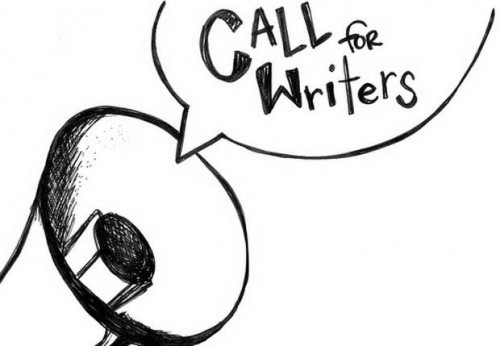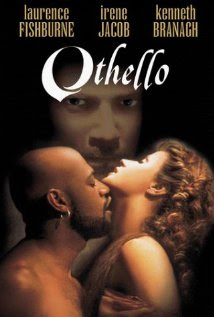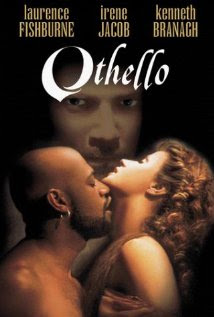First, allow this to sink in: Laurence Fishburne was the first black actor to play Othello in a major film production of Shakespeare’s Othello.
In 1995.
One of the reasons Shakespeare’s texts are so timeless is that we can’t figure out how to evolve.
Othello (written around 1603) is about racism, jealousy, greed, trust and feminism.
While its themes of all-consuming greed and jealousy and misplaced trust are clear to all audiences–Iago is the ultimate villain, after all–and prejudice against Othello’s “otherness” seem unfortunately all too familiar, a feminist reading of the text illuminates two female characters who embody many shades of feminism.
Oliver Parker’s 1995 film adaptation is stunning, and the
actors are excellent. Kenneth Branagh plays Iago perfectly, and Fishburne is a smoldering Othello, convincing in his love with Desdemona (Irene Jacob), his valor as a leader and his downfall at the hands of infectious, false jealousy. Emilia (Anna Patrick) is the acerbic wife of Iago and assistant to Desdemona, who delivers a shockingly 21st century monologue before unraveling her husband’s villainy.
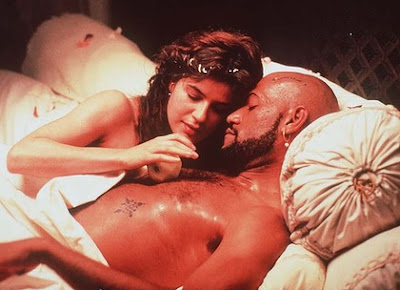 |
| Desdemona and Othello’s love is new and vulnerable to outside attack. |
Iago explains early on that he “hates the Moor,” and immediately sets down a path of attempting to ruin Othello’s happiness. While Iago cites jealousy of being passed up for promotion and the rumor that Othello once slept with Emilia, he doesn’t seem to be incredibly concerned with either situation. Iago truly hates women. He hates his wife and he hates Desdemona–after all, while his lies were directed at Othello, his plan was to turn Desdemona’s “virtue into pitch.” At the beginning of Act II, he lashes out at Emilia with contempt, and Desdemona attempts to correct him. Our villain–who is evil to the core without clear motive–is also villainous because he is cruel to women.
Some directors and filmmakers have seen a homoerotic lust that drives Iago to Othello and suggest that it is the root cause for his obsession. Parker seems to hint toward that reading, especially in the scene when Emilia delivers the stolen handkerchief to Iago. In the film, Iago first resists her sexual advances, and then she gives him the handkerchief he’d wanted. He delights in this, flips her over (suggesting sex without facing her) and he sniffs the handkerchief, which had last touched Othello’s sweaty brow. This may be nothing, but watching with the idea that maybe Iago’s deep jealousy and obsession with Othello lies in repressed homosexuality would make his actions have new meaning.
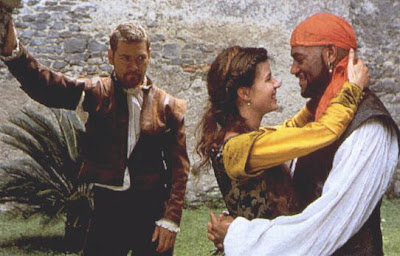 |
| Iago looks on with seething rage as Desdemona and Othello are still happy. |
As for the feminist themes of Othello, they are clear from the very beginning. Desdemona goes behind her father’s back to marry Othello–a celebrated general but not a native Venetian (he is a “Moor,” a black man of African/Muslim descent). She goes before the senate to prove Othello didn’t win her by “witchcraft” (see: racism) and she requests to travel with him to Cyprus. She stands up to her father convincingly, and while she is dutiful to the men in her life, she clearly has an independent spirit. Parker’s Desdemona is also sexual (he includes a sex scene between Othello and Desdemona, and shows flashbacks of their courtship and intimate relationship).
Desdemona is incredibly innocent, though, and her naive subservience (which was to be expected at the time) to Othello makes her blind to his outlandish suspicions and jealousy.
Emilia, on the other hand, is on the opposite end of the spectrum. She knows Desdemona legitimately lost the handkerchief and that Iago has it. When Emilia sees Othello go into a jealous rage, she assumes he’s showing his true self to Desdemona and that Desdemona might as well know now what husbands become. “They are all but stomachs, and we all but food;” she says. “They eat us hungrily, and when they are full/ They belch us.” Her jaded views of men and marriage cause her to think she’s protecting Desdemona by allowing her to see the true nature of men.
Shakespeare’s women are frequently much more complex than his men. One of my favorite theories of Shakespearean authorship is that
a Jewish woman actually wrote the plays–this would, I admit, make a lot of sense considering his female characters are more drawn out than most women in Hollywood films 400 years later.
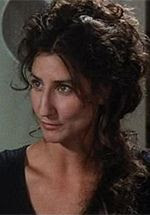 |
| Emilia is jaded about men and marriage, and has realistic views of female sexuality. |
Emilia’s speech in Act IV is groundbreaking in terms of its frank discussion of female sexuality. Desdemona, preparing to go to bed (and presumably be punished and killed by her husband, although she knows she’s innocent) asks Emilia if she can imagine that any woman would ever be unfaithful to her husband. She couldn’t understand Othello’s accusations, because she couldn’t imagine a woman ever having sexual relationships outside of marriage.
Emilia steps in and basically says, “Of course!” She says:
But I do think it is their husbands’ faults
If wives do fall: say that they slack their duties,
And pour our treasures into foreign laps,
Or else break out in peevish jealousies,
Throwing restraint upon us; or say they strike us,
Or scant our former having in despite;
Why, we have galls, and though we have some grace,
Yet have we some revenge. Let husbands knowTheir wives have sense like them: they see and smellAnd have their palates both for sweet and sour,As husbands have. What is it that they do
When they change us for others? Is it sport?
I think it is: and doth affection breed it?
I think it doth: is’t frailty that thus errs?
It is so too: and have not we affections,Desires for sport, and frailty, as men have?Then let them use us well: else let them know, The ills we do, their ills instruct us so. (IV. iii. 89 – 107) (emphasis added)
There still exists a strict double standard about men’s and women’s sexuality–men are subjects, women are objects. Men cheat because they want sex, women cheat because they want love. Scientists
still debate the existence of the G-spot. The fact that this monologue was written 400 years ago and still seems groundbreaking is profoundly depressing.
 |
| Desdemona prepares to be punished. |
Desdemona dies at the hands of a jealous husband who thinks he’s acting justly (
this still happens, of course). Emilia dies at the hands of a husband whose schemes almost work, but she figures him out and exposes him. Othello manages to regain some of his reputation before committing suicide–dying at his own dishonored hand.
The women are the true victims of Iago’s manipulation and Othello’s weakness. Desdemona and Emilia are both wiser than the men around them, but they have no power. This tragedy is not lost on Parker, who adeptly paints passionate and angry female characters to foil the men’s foolish actions.
The pile of dead bodies at the end–a hallmark of Shakespeare’s tragedies–were meant to convey messages about jealousy, racism and the toxicity of imbalanced gender relations to audiences hundreds of years ago. How unfortunate, then, that the play doesn’t even need to be adapted and restructured to make sense to a modern audience, because we still haven’t gotten it.
—–
Leigh Kolb is a composition, literature and journalism instructor at a community college in rural Missouri.
